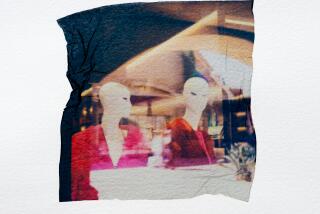Scrutinizing Shoppers’ Subconscious
- Share via
Four men and three women sit in deep hypnotic trances, heads bent and eyes shut tight. A hypnotist speaks soothingly to the group, asking it to tap into its deepest feelings about . . . luggage.
A man named Scott begins moving his hand from left to right, showing how he had recently tested the zipper on a black bag before buying it.
“Get away!” he suddenly shouts. “Get away!”
Prodded by the hypnotist, Scott explains that a luggage salesman had pestered him.
“This guy . . . he’s bothering me,” complains Scott as he recounts the incident. “He’s very pushy.”
Welcome to a seldom seen side of consumer research. Besides sifting through piles of surveys and statistics, some advertisers are using hypnosis to find out what consumers think.
Scott was part of a focus group sponsored by Andiamo Inc., a Fountain Valley manufacturer of upscale luggage that is facing stiff competition from premier brands Hartmann and Tumi. Andiamo hoped to learn from the focus group how consumers regard the Andiamo brand.
The session is held in a small room belonging to a Brentwood research firm. Participants--all high-income business travelers--sit around a rectangular table, their eyes closed and their hands on their laps. A large mirror--actually a one-way glass--covers one wall. People from Andiamo and its advertising agency sit in a dark room on the other side of the glass, watching the action and taking notes.
The hypnotist, Irvine consultant Hal Goldberg, begins the session by telling group members to inhale deeply and focus their eyes on a green spot on the wall behind him.
“A warm sensation is creeping over your body . . . your lids are getting heavy and starting to close . . . your knees are floating up to the ceiling,” he says calmly.
Goldberg tells the people in the group to imagine they are riding an elevator down from the 20th floor. When they reach the lobby, he assures them, they’ll be in deep hypnosis.
One by one, each person silently raises a hand to let Goldberg know he or she has reached the imaginary lobby. Goldberg soon asks them to describe the last time they bought luggage.
Each person in turn shares a memory. Tracy, a sales manager, wanted a classy-looking bag with rollers. Barbara, an academic, wanted a bag that could expand to a larger size. Chris, a video system installer, shopped for a light carry-on bag for a trip to Seattle.
“Don’t like heavy bags . . . have to carry through airport . . . think this is the cheapest store,” Chris says in a slow monotone, his head slumped on his shoulder.
Questioned further, Chris remembers fretting about his choice--a small black bag with wheels: “I hope I made the right decision.”
The technique is controversial among researchers and hypnotists.
“I can’t imagine a situation where it would be necessary . . . where it is the only way to get an answer,” said Thomas Greenbaum, author of two texts about focus group research. Greenbaum said successful focus groups depend on group interaction, which is severely limited in hypnosis.
“The whole thing sounds pretty gimmicky,” he said.
Edward Frischholz, editor of a journal on hypnosis research, said there’s no proof that hypnosis improves recollection of mundane events--like buying luggage.
“There seems to be this belief that hypnosis is a memory-enhancement technique, and it’s not,” he said.
Barbara Wingate, a senior partner at J. Walter Thompson in San Francisco, is convinced hypnosis works.
She said the agency hired Goldberg to explore how consumers felt the first time they made a long-distance telephone call. The agency creates ads for Sprint.
“I felt like we got a lot of interesting memories . . . things we hadn’t heard before,” Wingate said.
She said the research is helping the agency understand why consumers choose a particular long-distance company--and what makes them switch.
Goldberg contends hypnosis allows people to relax, so they can then better focus on memories about inconsequential events.
Goldberg is one of the technique’s few practitioners to apply it to advertising. He said he first dabbled in hypnosis 25 years ago while working for a small advertising agency in Minneapolis. Since opening his Irvine research firm in 1996, he’s been conducting two to three focus groups using hypnosis monthly, for clients ranging from Fortune 500 companies to small firms such as Andiamo.
With its advertising agency, Townsend & O’Leary of Laguna Hills, Andiamo is conducting research to help it develop new advertisements. Together they conducted a telephone survey to find out what consumers think and analyzed warranty card information to learn more about their customers. They sent undercover shoppers to luggage stores to find out how salespeople view Andiamo.
David LaBonte, director of the Andiamo account at Townsend & O’Leary, said the agency was dissatisfied with the results of a conventional focus group. He said the discussion was dominated by a few people with strong opinions, causing the agency to question the truthfulness of the comments.
LaBonte said the agency, though skeptical, decided to try hypnosis in search of honest answers from consumers. The effect of hypnosis on focus group participants, he said, was “like a shot of sodium Pentothal.”
After the Andiamo focus group shares its feelings about luggage, Goldberg reads to the participants a mock advertisements for Andiamo. One mock ad boasts that Andiamo luggage is specially made so that clothes will be wrinkle-free.
Goldberg asks each participant for an opinion.
“Wrinkle-free. Believe it? No,” says Chris.
“A tall promise,” says Scott.
“Promising a lot,” says Linda, a financial consultant.
The answers aren’t exactly what Andiamo Vice President Roger Coe and Townsend & O’Leary Vice President W. Scott Griffiths had hoped to hear.
“We’re in trouble with that one,” says Griffiths from his seat behind the glass.
Another mock ad touts Andiamo as the luggage for the frequent traveler.
“Frequent traveler is not the right image,” Dan, a lawyer, says thoughtfully. “I thought of smart traveler.”
Griffiths and Coe perk up. Smart traveler!
“That’s one we haven’t heard before,” says Coe, excited by the revelation.
“Smart traveler,” says Griffiths, who left Townsend & O’Leary a month after the December focus group. “To me, that’s the key.”
More to Read
Inside the business of entertainment
The Wide Shot brings you news, analysis and insights on everything from streaming wars to production — and what it all means for the future.
You may occasionally receive promotional content from the Los Angeles Times.










